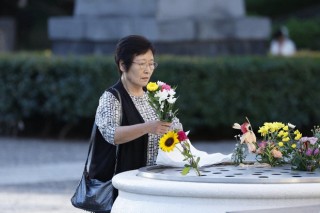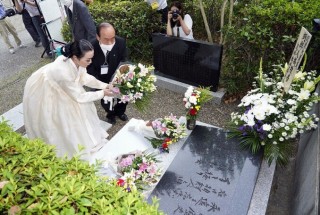Loading
Search
▼ Japan Marks Centenary Of Great Kanto Earthquake Disaster
- Category:Other
Japan on Friday marked the centenary of the Great Kanto Earthquake that devastated the capital and surrounding areas, killing an estimated 105,000 people in the deadliest natural disaster in the country's history.
Ceremonies were held across the country to honor those who lost their lives in the magnitude-7.9 temblor and ensuing conflagration, as well as separate events to commemorate the Koreans and others who were massacred in the chaos following the disaster.
The quake not only caused buildings to collapse but also triggered fires in which about 90 percent of the casualties died along with tsunamis and mudslides.
The government designates Sept. 1 as Disaster Prevention Day, with drills held across the country every year to raise public awareness and disseminate disaster prevention knowledge.
Prime Minister Fumio Kishida took part in a central government drill in Tokyo based on the scenario that a magnitude 7.3 quake occurred at around 7:10 a.m.
Kishida and other Cabinet ministers walked to the prime minister's office and held a mock emergency meeting to gather information on damage and necessary relief supplies.
"Please evacuate to a safe location and take action to save lives," Kishida said at a press conference held as part of the drill. "Remain calm to minimize the economic and social effects (of the earthquake)."
A memorial service was held at a memorial hall in the capital's Yokoamicho Park in Sumida Ward where 38,000 people died due to a fire whirlwind, joined by around 130 people including the families of the victims, Crown Prince Fumihito and Crown Princess Kiko.
"We pledge that we will hand down to future generations a safe and peaceful Tokyo," said Rinji Nakamura, deputy governor of Tokyo, as he read out a statement by Tokyo Gov. Yuriko Koike.
The site was visited by people from the morning to pay their respects to the victims.
Hideo Kobayashi, 87, spoke about how his father lost an ear and suffered burns across his back in the blaze. "He told me how the 'fires were running, chasing after me.' I came to visit for the first time in a while for the anniversary."
According to the Cabinet Office, the Great Kanto Earthquake caused around 5.5 billion yen ($37.8 million) in economic damage, equivalent to some 37 percent of Japan's gross national product at the time.
Separate ceremonies for those massacred in the aftermath were also held in and around Tokyo. Koreans and Chinese people were killed by the military, police and vigilante groups amid false rumors that they planned to stage an uprising or, in the case of Koreans, that they were poisoning wells.
According to a report by the government's council on disaster management, massacre victims made up from 1 to several percent of those who died in the disaster.
While previous Tokyo governors had paid tribute to the Korean victims every year, Koike has mostly refrained from doing so on grounds that her condolence message commemorates all victims.
Ceremonies were held across the country to honor those who lost their lives in the magnitude-7.9 temblor and ensuing conflagration, as well as separate events to commemorate the Koreans and others who were massacred in the chaos following the disaster.
The quake not only caused buildings to collapse but also triggered fires in which about 90 percent of the casualties died along with tsunamis and mudslides.
The government designates Sept. 1 as Disaster Prevention Day, with drills held across the country every year to raise public awareness and disseminate disaster prevention knowledge.
Prime Minister Fumio Kishida took part in a central government drill in Tokyo based on the scenario that a magnitude 7.3 quake occurred at around 7:10 a.m.
Kishida and other Cabinet ministers walked to the prime minister's office and held a mock emergency meeting to gather information on damage and necessary relief supplies.
"Please evacuate to a safe location and take action to save lives," Kishida said at a press conference held as part of the drill. "Remain calm to minimize the economic and social effects (of the earthquake)."
A memorial service was held at a memorial hall in the capital's Yokoamicho Park in Sumida Ward where 38,000 people died due to a fire whirlwind, joined by around 130 people including the families of the victims, Crown Prince Fumihito and Crown Princess Kiko.
"We pledge that we will hand down to future generations a safe and peaceful Tokyo," said Rinji Nakamura, deputy governor of Tokyo, as he read out a statement by Tokyo Gov. Yuriko Koike.
The site was visited by people from the morning to pay their respects to the victims.
Hideo Kobayashi, 87, spoke about how his father lost an ear and suffered burns across his back in the blaze. "He told me how the 'fires were running, chasing after me.' I came to visit for the first time in a while for the anniversary."
According to the Cabinet Office, the Great Kanto Earthquake caused around 5.5 billion yen ($37.8 million) in economic damage, equivalent to some 37 percent of Japan's gross national product at the time.
Separate ceremonies for those massacred in the aftermath were also held in and around Tokyo. Koreans and Chinese people were killed by the military, police and vigilante groups amid false rumors that they planned to stage an uprising or, in the case of Koreans, that they were poisoning wells.
According to a report by the government's council on disaster management, massacre victims made up from 1 to several percent of those who died in the disaster.
While previous Tokyo governors had paid tribute to the Korean victims every year, Koike has mostly refrained from doing so on grounds that her condolence message commemorates all victims.
That stance has led to her being accused by groups organizing the event of turning her back on history.
"In order for us to ensure that such things never happen again, we must know the facts, receive apologies for those facts, and people must be informed," Lin Boyao, co-chair of the Executive Committee for the 100th Anniversary of the Korean and Chinese Massacre after the Great Kanto Earthquake, said during a press conference at the Foreign Correspondents' Club of Japan in Tokyo on Wednesday.
The Japanese government has avoided issuing an apology and has not provided compensation to the massacre victims due to a "lack of records" that refer to the killings.
While the country has made efforts to make buildings more resilient to earthquakes and fires over the last century, there are still regions with many wooden structures, while the increase in high-rise buildings is expected to create new issues in the case of an emergency.
The population of Tokyo has ballooned from about 4 million at the time of the Great Kanto Earthquake to around 14 million today, raising fears that a major disaster in the capital will leave many people stranded.
"In order for us to ensure that such things never happen again, we must know the facts, receive apologies for those facts, and people must be informed," Lin Boyao, co-chair of the Executive Committee for the 100th Anniversary of the Korean and Chinese Massacre after the Great Kanto Earthquake, said during a press conference at the Foreign Correspondents' Club of Japan in Tokyo on Wednesday.
The Japanese government has avoided issuing an apology and has not provided compensation to the massacre victims due to a "lack of records" that refer to the killings.
While the country has made efforts to make buildings more resilient to earthquakes and fires over the last century, there are still regions with many wooden structures, while the increase in high-rise buildings is expected to create new issues in the case of an emergency.
The population of Tokyo has ballooned from about 4 million at the time of the Great Kanto Earthquake to around 14 million today, raising fears that a major disaster in the capital will leave many people stranded.
- September 1, 2023
- Comment (0)
- Trackback(0)



